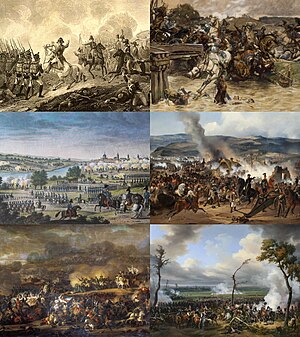
Back الحملة الألمانية لعام 1813 Arabic Campanya Militar d'Alemanya del 1813 Catalan Befreiungskriege German Campagne d'Allemagne (1813) French המערכה בגרמניה (1813) HE Campagna di Germania del 1813 Italian 解放戦争 (ドイツ) Japanese Duitse bevrijdingsoorlog Dutch Освободительная война в Германии Russian 德意志解放战争 Chinese


The German campaign (German: Befreiungskriege, lit. 'Wars of Liberation') was fought in 1813. Members of the Sixth Coalition, including the German states of Austria and Prussia, plus Russia and Sweden, fought a series of battles in Germany against the French Emperor Napoleon, his marshals, and the armies of the Confederation of the Rhine - an alliance of most of the other German states - which ended the domination of the First French Empire.[d]
After the devastating defeat of Napoleon's Grande Armée in the Russian campaign of 1812, Johann Yorck – the general in command of the Grande Armée's German auxiliaries (Hilfskorps) – declared a ceasefire with the Russians on 30 December 1812 via the Convention of Tauroggen. This was the decisive factor in the outbreak of the German campaign the following year.
The spring campaign between France and the Sixth Coalition ended inconclusively with a summer truce (Truce of Pläswitz). Via the Trachenberg Plan, developed during a period of ceasefire in the summer of 1813, the ministers of Prussia, Russia, and Sweden agreed to pursue a single allied strategy against Napoleon. Following the end of the ceasefire, Austria eventually sided with the coalition, thwarting Napoleon's hopes of reaching separate agreements with Austria and Russia. The coalition now had a clear numerical superiority, which they eventually brought to bear on Napoleon's main forces, despite earlier setbacks such as the Battle of Dresden. The high point of allied strategy was the Battle of Leipzig in October 1813, which ended in a decisive defeat for Napoleon. The Confederation of the Rhine was dissolved following the battle with many of its former member states joining the coalition, breaking Napoleon's hold over Germany.
After a delay in which a new strategy was agreed upon, in early 1814 the coalition invaded France, coinciding with the march of Duke of Wellington's British army northward from Spain into southern France. Napoleon was forced to abdicate and Louis XVIII assumed the French throne. The war came to a formal end with the Treaty of Paris in May 1814.
- ^ Hans A. Schmitt. Germany Without Prussia: A Closer Look at the Confederation of the Rhine. German Studies Review 6, No. 4 (1983), pp 9-39.
- ^ a b c Maude 1908, p. 156.
- ^ Maude 1908, p. 149.
- ^ a b Maude 1908, p. 148.
- ^ a b Bodart 1916, p. 46.
Cite error: There are <ref group=lower-alpha> tags or {{efn}} templates on this page, but the references will not show without a {{reflist|group=lower-alpha}} template or {{notelist}} template (see the help page).
© MMXXIII Rich X Search. We shall prevail. All rights reserved. Rich X Search

